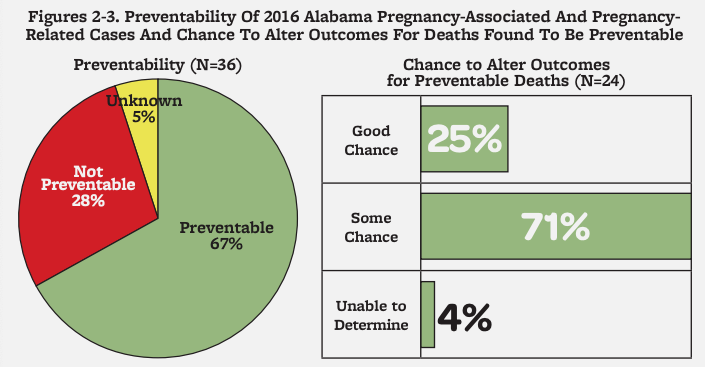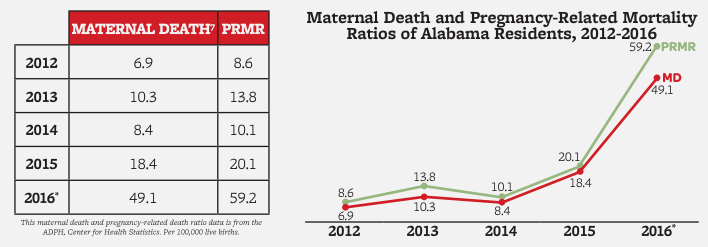A report this month by the Alabama Maternal Mortality Review Committee found that nearly 70 percent of pregnancy-associated and pregnancy-related deaths in Alabama recorded in 2016 were preventable.
Mental health and substance use disorders were identified as key contributors in nearly half pregnancy-associated and pregnancy-related deaths. Patient-, family-, system- and provider-related factors were among the most frequently identified factors involved in pregnancy-associated and pregnancy-related deaths, the report found.
The researchers found cardiovascular conditions were the leading underlying causes in pregnancy-related deaths.
“The Medical Association of the State of Alabama commends the Maternal Mortality Review Committee (MMRC) for its diligence in researching the factors that impact maternal deaths, in hopes to mitigate and prevent future maternal deaths,” said Dr. John Meigs, president of the Alabama Medical Association. “It is very concerning for physicians throughout the state that 70 percent of the deaths reviewed by the MMRC were preventable and that women of color are disproportionately affected. Alabama mothers deserve the best medical care that we can offer.”

Preventability of deaths is a key component to maternal mortality reviews, as it is indicative of events that may have been avoided if reasonable changes could be made to the contributing factor or factors. It was found that nearly 70 percent of pregnancy-associated and pregnancy-related deaths were preventable. (VIA ALABAMA MATERNAL MORTALITY REVIEW COMMITTEE/ALABAMA DEPARTMENT OF PUBLIC HEALTH)
According to the report, maternal death and pregnancy-related mortality ratios steadily trended upwards between 2012 and 2015 with the largest increase being in 2016.
Alabama ranks third in the nation for maternal mortality behind only Arkansas and Kentucky.

Data provided by the ADPH Center for Health Statistics reveal that both maternal deaths and pregnancy-related deaths trended upward between 2012 and 2016. Between 2012 and 2015, ratios increased steadily; however, in 2016 there was a marked leap in both ratios. (VIA ALABAMA MATERNAL MORTALITY REVIEW COMMITTEE/ALABAMA DEPARTMENT OF PUBLIC HEALTH)
According to the report, expanding Medicaid could help reduce the state’s high number of maternal deaths and pregnancy-related and -associated deaths.
“Expansion of Medicaid was an underlying, yet significant factor which permeated throughout the case reviews,” according to the committee’s report. “Research has shown that in states where Medicaid expansion was adopted, there were reduced maternal mortality rates and positive maternal health outcomes. Based on the findings of the committee’s review, Medicaid program expansion will allow women to receive needed healthcare before, during, and after pregnancies.”
The MMRC recommends Medicaid expansion up to one year postpartum and improved reimbursement for providers, routine autopsies on maternal deaths, and increased mental health and substance use disorder treatments and services for women.
“Sadly, the Alabama Maternal Mortality Review Committee found that mental health and substance use disorders were identified as key contributors in almost half of pregnancy-associated and pregnancy-related deaths,” said Holly Caraway McCorkle, executive director of the Alabama Council for Behavioral Healthcare. “These deaths are preventable, and Medicaid expansion will offer women who suffer from mental health and substance use disorders life-saving coverage and access to critically needed resources and services before, during and after pregnancies.”





















































